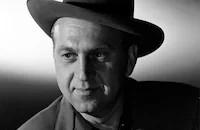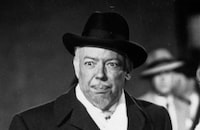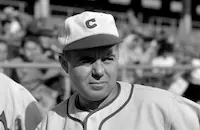The Great Gatsby
Brief Synopsis
Cast & Crew
Elliott Nugent
Alan Ladd
Betty Field
Macdonald Carey
Ruth Hussey
Barry Sullivan
Film Details
Technical Specs

Synopsis
Twenty years after the death of self-made millionaire Jay Gatsby, his friends, Nick Carraway and Jordan Baker, visit his grave and reminisce: In the Prohibition era of 1928, bootlegger Jay pursues his dream and buys a mansion in East Egg, on Long Island Sound. Jay lavishly redecorates the mansion, which was chosen specifically because it provides a view across the channel to the Buchanan mansion in exclusive West Egg. After a couple of weeks, Jay invites his neighbor, Nick, to one of his extravagant parties. Jay hardly knows a soul there, and Nick quickly sees through his pretense of grandeur. Jay admits that he is a self-made man and tells Nick about his rise: After growing up poor along Lake Superior, Jay is befriended by Dan Cody, an elderly, wealthy seaman who is spending his declining years sailing around the world with his young wife Ella. Jay joins the Codys on their travels and becomes sophisticated and worldly, taking to heart Dan's advice that only money counts. Although Jay is like a son to Dan, Dan encourages Jay to seduce Ella, who rebuffs him until the moment Dan dies, when she presses a kiss on him. Jay is disgusted by Ella's cold heart, and when he rejects her, she prevents him from claiming his $25,000 inheritance from Dan. Now, twelve years later, Jay prefers to be surrounded by socialites. Having sketched out his life to Nick, Jay asks him to arrange a private tea with Daisy Buchanan, Nick's cousin. Nick goes to visit Daisy, her husband Tom, and their friend, Jordan, and learns from Jordan that Daisy had promised herself to Jay before he went to war, but after a year and a half, abandoned him to marry wealthy football hero Tom. Although she has a daughter, Daisy is unhappy in her marriage, as she knows that Tom is having an affair with Myrtle Wilson, the loose wife of a gas station owner. Jordan insists that Jay give her his expensive Duesenberg car in exchange for arranging the private meeting with Daisy. Daisy is thrilled to see her first love again, and after Jay proudly gives her a tour of his house, he asks her to leave Tom. Nick, meanwhile, learns from Jay's righthand man, Klipspringer, that Jay was a war hero, and after returning home and being jilted by Daisy, won a $5,000 settlement on his inheritance, and built a bootlegging fortune with his business partner, Myron Lupus. The next night, Daisy convinces Tom to attend one of Jay's parties, but Tom jealously takes her home after seeing her emerge from the library with Jay with an air of intimacy. Daisy is unable to broach the subject of a separation with Tom, and on a stifling hot day, she, Tom, Jordan, Nick and Jay travel into town in their expensive, look-alike automobiles. When Tom stops for gas, Wilson, who values Tom's patronage, asks for a loan so that he can leave the state with Myrtle, whom he no longer trusts. Unknown to Tom, Wilson has locked his wife in their apartment above the garage. Later in a hotel room in town, Daisy insists to Jay that she has never loved Tom. Although Daisy is surprised to learn of Jay's disreputable background, she leaves with him after demanding a separation from Tom. On their return drive, Myrtle runs onto the road thinking that Tom is in the car, and when Daisy swerves to avoid a truck, she hits Myrtle and keeps driving. Myrtle dies, and Wilson suddenly realizes that Tom was her lover and believes that he killed her. Jay takes the hysterical Daisy home and insists that he be allowed to take the blame for the accident, then drives the dented car back to his house. When he returns to the Buchanan home for Daisy, he overhears her discussing the accident with Tom and agreeing to let Jay take the blame so that her life will not be tainted. Nick is revolted by Tom and Daisy's ruthless self-preservation and breaks off their friendship. That night, a deranged Wilson slips into Tom's house intending to shoot him, but leaves without harming him after he denies hitting Myrtle, and suggests that someone else in the neighborhood owns a yellow sedan like his. The next morning, Daisy beseeches Tom to help her find the strength to go the police, and although Tom refuses, he does call Jay to warn him about Wilson. Jay, resting poolside, lets the phone ring unanswered, and tells Nick that his friend Dan was wrong about money. Jay states that he is now ready to accept the blame for the accident as a way of repaying the years of his ill-gotten gains. Just then, Wilson fatally shoots Jay. Only Nick and Jordan attend Jay's burial and, saddened by his hollow life, they decide to return to the Midwest together.

Director

Elliott Nugent
Cast

Alan Ladd

Betty Field

Macdonald Carey

Ruth Hussey

Barry Sullivan

Howard Da Silva

Shelley Winters

Henry Hull

Carole Mathews

Ed Begley

Elisha Cook Jr.

Nicholas Joy
Walter Greaza Kinsella

Tito Vuolo
Diane Nance

Ray Walker
Lisa Golm
Hugh Murray
Jack Lambert
Jack Gargan
Byron Poindexter
Gordon Nelson
Marion Gray
Phyllis Godfrey
Bruce Carruthers
Edward Clark
Edward Biby
Jack Roberts

Bess Flowers

Ray Teal
Robert Cunningham

James Davis
William Self
Dee La Nore
Marc Hamilton
James Lee
Len Hendry
Jerry James
Hal Rand
Lucille House
Howard Joslin
Sam Ash
Bill Sheehan
Dorothy Dayton
Bhogwan Singh
Bill Meader
Lynn Romer
Jeanne Romer
Renee Randall
Bob Templeton
Dick Keene
Nancy Duke
John Alban
George Murray
Herbert S. Naish
Crew
Lewis Allen
John [a.] Anderson
Roland Anderson
Phil Boutelje
Henry Brill
Frank Caffey
William H. Coleman
Sam Comer
Irving Cooper
Bill Cunningham
Ruth Davis
Robert Emmett Dolan
Jan Domela
Hans Dreier
Dave Dreyer
Josephine Earl
Farciot Edouart
Hugo Grenzbach
Edith Head
Ellsworth Hoagland
Warren Hogue
William Hole
Cyril Hume
Gordon Jennings
Richard L. Johnston
Al Jolson
Edith Keon
Floyd Knudtson
Jack Koffman
Leroy Krueger
Sam Ledner
Harold Lierly
Richard Maibaum
Richard Maibaum
Richard Maibaum
Nellie Manley
Bert Mckay
Sam Miller
Mickey Moore
Ray Moyer
Wally Nogle
Walter Oberst
Otto Pierce
Gordon Rayburn
Robert Reed
Irmin Roberts
Billy Rose
John F. Seitz
Harlow Stengel
Walter Taylor
Fred True
Lenore Weaver
Wally Westmore
Charles Woolstenhulme

Film Details
Technical Specs

Quotes
Trivia
Notes
According to a Hollywood Reporter news item, and a modern interview with producer and co-author Richard Maibaum, Paramount originally intended for John Farrow to direct this film, but Farrow withdrew over disagreements about the production. (Farrow's daughter, Mia Farrow, later appeared as "Daisy" in Paramount's 1974 production of The Great Gatsby.) Information in the MPAA/PCA Collection at the AMPAS Library reveals the following information about the production: Paramount first submitted a draft of the story in February 1946, which the PCA rejected due its inclusion of "illicit sex and adultery, without sufficient compensating moral values." In April 1946, in a letter regarding four screenplays, including The Great Gatsby, PCA director Joseph I. Breen requested that Paramount "dismiss from further consideration...any thought of making [The Great Gatsby] into [a] screenplay."
Paramount continued to submit story outlines to the PCA. However, in June 1946, Breen noted in a letter that "to salvage this story and to produce it as a motion picture at this time, would be a very definite disservice to this industry as a whole" and recommended that the filmmakers take up the matter with the PCA's Board of Directors. Almost a year later, Paramount submitted a "rough treatment" of the screenplay to the PCA, and noted in a letter that "Maibaum has done a swell job of capturing the moral flavor that was so necessary to make the story acceptable." Breen responded that the basic story was indeed acceptable, although he noted in his February 1947 letter that "we believe it will be necessary to remove the suicide on the part of Wilson [and] the second part [which] has a reference to the characterization of Mr. Buchanan as a man who has had adulterous affairs."
In a 1973 interview in Los Angeles Times, Maibaum noted that Breen suggested adding a prologue to the story, and Maibaum ultimately complied by including on "Gatsby's" tombstone a biblical quote from Proberbs 14:12: "There is a way which seemeth right unto a man but the end thereof are the ways of death." In the interview, Maibaum concludes that although the quote "seemed apt enough at the time...I think now it was anti-Fitzgerald, too explicit, too much on the nose....Fitzgerald wasn't a moralizer." Portions of the film differ significantly from the novel, such as the prologue, the sequence featuring "Gatsby's" pre-Egg years and the final scene depicting a definite romance between "Nick" and "Jordan." Reviews such as Hollywood Reporter remarked that "some changes have been made in the story, especially in providing a different background for the hero's youth" and that there was "too much moralizing in the dialogue-heavy script," while the New Yorker reviewer noted that "the players bear little resemblance to the characters created by Fitzgerald." The New York Times reviewer added that unlike Gatsby's novel, "the flavor of the Prohibition era is barely reflected in this new film."
Although actor Alan Ladd was announced for the lead role as early as 1946, because of the lengthy delay in production, he reportedly threatened to take a suspension until the studio proceeded with the film. According to the Maibaum interview, this, along with the PCA's approval of the script, compelled the studio to finally begin production. A Hollywood Reporter news item indicated that the wood-panelled library seen in "Gatsby's" mansion was purchased by the studio from the Hearst collection.
In 1926, Paramount made a silent version of Fitzgerald's novel, directed by Herbert Brenon and starring Warner Baxter, Lois Wilson and Neil Hamilton (see AFI Catalog of Feature Films, 1921-30; F2.2225). Francis Ford Coppola produced Paramount's third adaptation in 1974, which was directed by Jack Clayton and starred Robert Redford, Mia Farrow and Sam Waterston.












